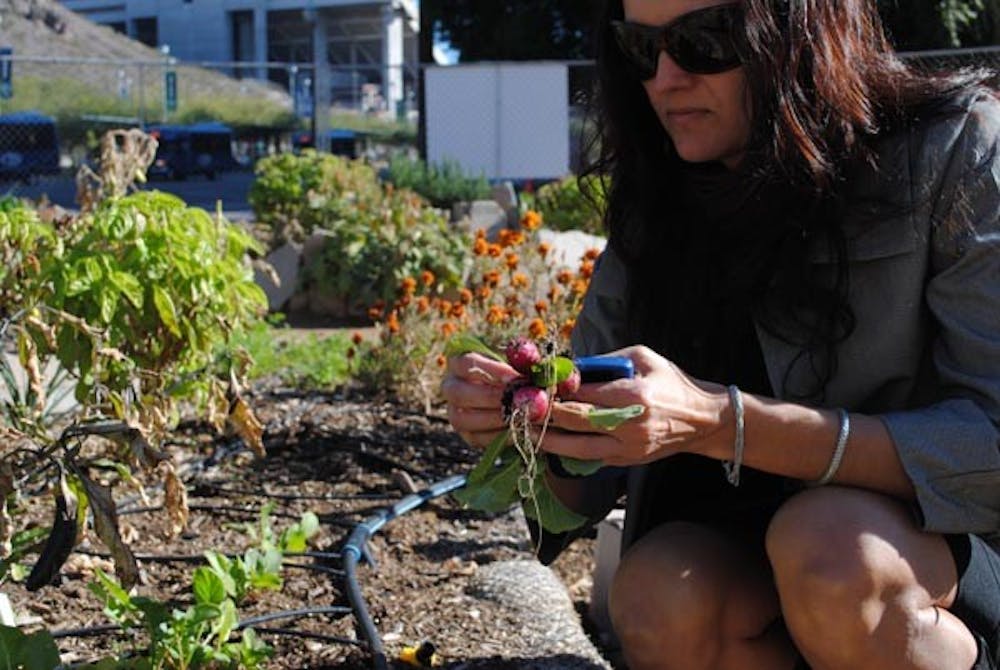Tempe may be getting its first community garden on public land, and sponsors of the project said they hope it will educate and unify the surrounding neighborhood.
The Tempe City Council heard a proposal Thursday to lease public land to the Tempe Community Action Agency, a nonprofit social service group. The garden would be located at Escalante Park near River and University drives.
The garden would also serve as a pilot project for future gardens on public land. The council is expected to vote on the proposal Jan. 27.
Councilwoman Onnie Shekerjian, who heads the city’s council committee on Technology, Economic and Community Development, said the council hopes the city will be able to lease land to other nonprofits in about a year.
“We’re using this to work out the bugs — no pun intended,” Shekerjian said.
The city will be able to oversee the gardens to a certain extent because they are on public land, which is a positive aspect of the lease agreement, Shekerjian said.
“We don’t want someone to start a garden and then leave it fallow or empty,” she said.
The lack of open space in Tempe makes public parks a viable option for community gardens, which are beneficial to the neighborhood, Shekerjian said.
“It’s a really good community builder,” she said. “It’s been a very organic process with community members, the TCAA and other groups coming together.”
Beth Fiorenza, executive director of the Tempe Community Action Agency, said her group is sponsoring the project and taking on all costs of the garden, including seeds and maintenance. The lease agreement states the TCAA would pay the City of Tempe $1 for a one-year lease.
“Our hope is that it will bring the community together,” Fiorenza said. “We want to make it a gathering place and also for it to give back to the community.”
The goal is for one-third of the garden’s yield to go into the food pantry at the TCAA offices located near Escalante Park to help feed families in the Escalante neighborhood, and one-third will go to those who work on the garden. The rest will possibly be sold at farmers markets to help raise funds for the maintenance of the garden and seeds, she said.
“The garden will have an educational component for the community,” Fiorenza said.
By volunteering to work on the garden, community members will “learn how to create their own compost pile and how to create their own garden in their own backyard,” she said.
Putting the garden on public land rather than private land is an important distinction, she said.
“This would be the first one, and it’ll help people in the future to create gardens,” she said. “It just is better for the community as a whole.”
Members of Tempe Leadership Class XXVI, a program of the Tempe Chamber of Commerce that teaches leadership skills to community members, attended Thursday’s City Council meeting to show their support for the garden.
Adam Kress, a member of the group, said every leadership class has a service project and his class chose the garden because of what it represented.
“From the beginning we had a green, renewable energy focus,” Kress said. “A lot of us wanted to do something environmental.”
There are several other community gardens in Tempe located on private lands, including the Tempe Urban Garden at Fifth Street and Forest Avenue.
Lara Skutt, deputy director of Downtown Tempe Community, Inc., a private nonprofit, manages the Tempe Urban Garden and said it’s important for people, especially children, to know that food doesn’t grow on supermarket shelves.
“Younger generations don’t understand where food truly comes from,” Skutt said. “When my kids would dig up potatoes in their own gardens, they made the connection of where food really comes from.”
Biochemistry junior Arya Akhavan is the president of ASU Grow, a student gardening club on the Tempe campus with a community garden on the south side of the Social Sciences building near the Memorial Union.
Akhavan said in an e-mail that the importance of urban gardening is underestimated.
“There's a wide gap between people's knowledge of food and the food that they actually eat,” he said. “We actually had a student come in to garden who had never seen an eggplant, and tried to eat one raw.”
He said “food literacy” is important for people’s health.
“When people have no idea what they're eating, then of course we're going to have all sorts of problems with obesity,” he said.
He said the Polytechnic campus also has a community garden through ASU’s School of Sustainability. There are currently independent efforts to establish one at the Downtown campus, Akhavan said.
Deborah Thirkhill, volunteer program coordinator for ASU Grow, said learning how to grow your own food in the desert is beneficial in many ways.
“It tastes much better, you’re eating locally, you’re reducing your carbon footprint and you’re learning firsthand how to get along in a group when people have different views on how to get things done,” Thirkhill said. “There’s all sorts of things to be learned from a community garden.”
The second public hearing on the lease agreement will be held Jan. 27, when the council is expected to vote on the proposal.
Reach the reporter at ymgonzal@asu.edu





